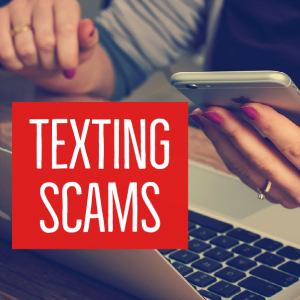Text message scams are on the rise. Don’t fall victim to these phishing scams. Scammers are using different tactics with one goal in mind – to get your personal information (bank information, social security number, ID).
Whether it’s trying to contact you via text message to tell you your package is on the way. Oh but there’s one catch, you have to pay for the shipment first. This package delivery scam seeks to get your credit card information to pay for the delivery. Be careful about clicking on any unknown links they send you. It could load virus software on your device.
Those are the tell tale signs of a common texting scam. But there are many others out there that you need to be aware of also.
Text Scams
Here are some other text scams:
- Free Netflix or other streaming service – People have been receiving text messages offering them free Netflix for a year due to the coronavirus pandemic. When you click the link it’s asks for your credit card payment information. Yeah, I know…I thought it was free.
- Bank – Some people receive texts that appear to be from their financial institution. But it’s not really your bank even if they may have a little of your account information. These scammers try to get you to provide your personal information like bank PIN and social security number.
- Driver’s License – Some scammers send text messages pretending to be your state’s department of motor vehicle (DMV) and request you to provide your personal information.
- Stimulus Checks – This scam tells you that your stimulus check is on the way. Before you can receive it, they need you to enter your personal information. If you click the link, it directs you to a fake IRS website. On the website you are directed to enter your personal and bank account information. Click here to read the IRS warning on these text scams.
Protect Yourself from Text Scammers
A few tips to help you avoid text scams:
- If it sounds too good to be true, it usually is. Do not believe the false promises scammers use to try and lure you to provide your personal information (credit card, bank account).
- Avoid sending any personal information requested via text messages. Real institutions safeguard your private information and do not request it in this phishing manner.
- Do not respond to texts from companies you did not sign up to hear from. If you get a strange text and think it might be real, just pick up the phone and contact the company.
- Do not click on links sent through text from unknown sources.
- If they keep contacting you, block them on your phone.


